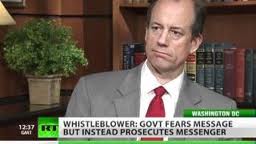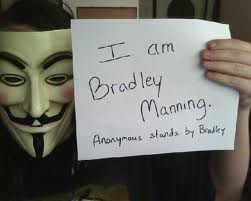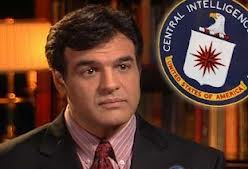Barrett Brown was almost put away for over 100 years. His crime: publicizing documents that reveal the shadowy world of intelligence contracting in the post-9/11 era.
Day after day headlines blare throughout the world about the attempts of governments to stifle freedom of speech, freedom of the press, and the freedom of people to associate online and off with whomever they choose.
The story of Barrett Brown, his work as both an activist and a journalist, should be better known, since it is one of the most telling illustrations of how we got to today’s climate of fear. In 2013, when few in the mainstream media were even noticing, WhoWhatWhy sat up, took notice and published this remarkable and prescient account of one man’s battle against government overreach.
Now that Brown is out of prison and once again speaking out — and doing regular podcasts for this site — we thought it was a good time to go back and take a look at our account of the nightmare that changed everything for him.
As we mentioned previously, Brown felt the story below truly reflects his experience:
“The piece published by WhoWhatWhy in 2013 was the first to provide a comprehensive explanation of what it was that my associates and I had uncovered to prompt one of the most bizarre and draconian criminal investigations in public memory. Four years later, that article remains the single most comprehensive summary of the private-public intelligence nexus that my Project PM organization documented. Well before The New York Times and its ilk came to understand what my case meant for the country as a whole, WhoWhatWhy had already told the story best.”
– Introduction by WhoWhatWhy Staff
Alleged “hacktivist” Barrett Brown, the 31-year old mislabeled “spokesman” for the shadowy hacker collective known as Anonymous, faces federal charges that could put him away for over a hundred years. Did he engage in a spree of murders? Run a child-sex ring? Not quite. His crime: making leaked emails accessible to the public — documents that shine a light on the shadowy world of intelligence contracting in the post-9/11 era.
 A critically acclaimed author and provocative journalist, Brown cannot be too easily dismissed as some unruly malcontent typing away in the back of a gritty espresso lounge. He is eccentric. And he was clearly high on something, if only his own hubris, when he made a threatening video that put him in the feds’ crosshairs. But that’s not the real reason for the government’s overreaction. Evidence indicates it has a lot more to do with sending a message to the community he comes from, which the government sees, correctly, as a threat.
A critically acclaimed author and provocative journalist, Brown cannot be too easily dismissed as some unruly malcontent typing away in the back of a gritty espresso lounge. He is eccentric. And he was clearly high on something, if only his own hubris, when he made a threatening video that put him in the feds’ crosshairs. But that’s not the real reason for the government’s overreaction. Evidence indicates it has a lot more to do with sending a message to the community he comes from, which the government sees, correctly, as a threat.
The Barrett Brown case is simply the latest in a string of prosecutions in which the government pursues anyone involved in making information “liberated” from governmental or corporate entities easily accessible to the public. Those targeted are not necessarily accused of the illegal entry itself (the “hack”) or violating contracts (as in the case of a “leak”). These are people performing a function analogous to that of a newspaper — yet they can face prison sentences longer than those prescribed for murderers, rapists, and terrorists.

whistleblower Thomas Drake
The Obama administration’s assault on accountability is dual-pronged: attack the messenger (as in the case of Brown, WikiLeaks, even New York Times reporters) and attack the source (Bradley Manning, John Kiriakou, Thomas Drake, etc.). In fact, seven of those sources have been indicted as traitors under the 1917 Espionage Act during the Obama years alone — more than double the “espionage” charges against whistleblowers by all previous presidential administrations combined.
The Espionage Act is a draconian relic from World War I designed to prevent infiltration by foreign agents, like those of the Kaiser’s Germany. It has a sordid history as an instrument against American dissenters who leak to the media, including Pentagon Papers whistleblower Daniel Ellsberg, but has been used sparingly hitherto — until Barack Obama’s administration.

The government’s position is that revealing this information to the media enables “enemies” to see it. Thus, whoever blows the whistle is “aiding the enemy.” But in these cases, the enemy is the American people.
***
Brown, in federal custody since September 2012, has been jousting with the feds for quite some time.
Round one of his travails began on March 6, 2012, when FBI agents raided his Dallas apartment, looking for evidence related to the 2011 hack of emails belonging to Stratfor — a private firm with substantial links to the American intelligence community. Brown sought refuge at his mother’s, but special agents arrived there as well, later in the evening. Although the feds found no incriminating evidence, they continued to harass Brown and his family, threatening to file obstruction of justice charges against Brown’s mother for hosting her son during the raid. This prompted Brown to record an ominous YouTube video threatening the special agent in charge of the investigation. He was arrested that evening and held for weeks without indictment, under the claim he was an imminent threat to the agent’s safety. In early October 2012, he was finally charged on a number of counts related to harassment of a federal officer.

In December of that year, while still in custody, he was indicted on an additional charge: “trafficking” in stolen material. Had he been shipping purloined goods across state lines? Hardly. His “trafficking,” according to the government, consisted of posting a link in a chat room.
On January 23 of this year came the coup de grâce. Brown was hit with a third round of federal charges — this time for allegedly concealing evidence during that initial March 2012 raid on his apartment
Officially unrelated to these charges is the real nut of the government’s dispute with Brown: his personal initiative known as ProjectPM.
Barrett’s Baby
ProjectPM is a crowd-sourced research effort with several aims. First, to study 75,000+ emails pilfered by Anonymous from military and intelligence contractor HBGary Federal, and its parent company HBGary. Second, to post these raw, primary-source documents to a website where readers can edit and contribute further information. Third, to use these documents to map out the relationships between private contractors and the federal government that form our current national security state.
Brown’s work is a potential bonanza for journalists, as one of the few efforts to come to grips with the explosive growth of the private intelligence industry in the last decade.
From February 2011 until Barrett’s arrest in September 2012, ProjectPM had publicly identified the following revelations within the hacked emails:
– A conspiracy by lobbying and cybersecurity firms to engage in a disinformation and sabotage campaign against critics of the Chamber of Commerce and Bank of America.
– An operational mass surveillance and data-mining program targeting the Arab world.
– An unnamed project to utilize online “Persona Management with the intent of manipulating information or perception, conducting data mining, [and] infiltrating social organizations.”
– The employment of American PR firms to discredit and sabotage dissidents from Yemen, Saudi Arabia, and Bahrain.
***
It isn’t hard to see the parallel with the case of free-information activist Aaron Swartz. On January 17, WhoWhatWhy wrote about the U.S. attorney for Massachusetts, Carmen Ortiz, whose avid prosecution of Swartz preceded his suicide, and focused attention on federal tactics and objectives. At the time he took his life, Swartz was facing a potential sentence exceeding 50 years — for attempting to release scholarly articles to the public. We laid out a number of other non-hacker related instances of prosecutorial overreach by Ms. Ortiz. The article concluded that Swartz’s treatment wasn’t anomalous, but “a symptom of the entire disease” that underlies America’s singular status as the world’s jailer — of those who anger formidable interests, and those without friends in the right places. Brown’s case is even more egregious. As even the government itself concedes, ProjectPM comes under the definition of the legitimate practice of journalism. Brown simply harnessed information gathered from someone else’s “criminal” hack. Then he used it to expose the foul and potentially illegal activities of some of the world’s leading corporations — in partnership with secretive sectors of the government.”
Brown punctured a wall of secrecy, constructed over the past decade, that shields the state from accountability to its citizens. For that, he is threatened with a century behind bars.
His tale deserves to be told, not just because of the injustice involved. It also shows the awesome power of the Internet in adjusting the balance sheet between the big guys and the small ones. And the lengths the insiders will go to keep their advantage.
Confessions of a Dangerous Mind
In a YouTube “confession” on September 12, 2012, Barrett Brown begins by explaining why he is “angry at the FBI.” A wiry redhead, Brown speaks in a sonorous baritone with a hint of Southern twang. After nervously admitting that he has a “case of the giggles” and is a recovering heroin addict, he composes himself and chronicles the story of ProjectPM and his assorted run-ins with the FBI.
Brown describes a March 2012 FBI raid on his residence in connection with alleged activities of the Internet hacker group Anonymous. With visible anger, he grouses that the criminal investigation now extends beyond him to an uninvolved member of his family.
Having received a vague warning the day prior, Brown sought haven at his mother’s house while government agents raided his apartment. Once the FBI realized the laptop they were seeking was not at Brown’s flat, they headed to Ms. McCutchin’s place (Brown’s parents are divorced), confronted her son, and — according to Brown — asked if he had any laptops he “wanted to give them.” When he responded in the negative, they left in a huff, only to return later with another search warrant — this time confiscating the sought-after laptop. As the investigation continued over the next few months, the feds could find no evidence on that laptop or anywhere else that related to criminal activity. That’s when they initiated a charge of obstruction of justice against his mother.
In his video, Brown lashed out, announcing unquestionably ominous sounding plans.
“I know what’s legal, I know what’s been done to me… And if it’s legal when it’s done to me, it’s going to be legal when it’s done to FBI Agent Robert Smith — who is a criminal.”
“That’s why [FBI special agent] Robert Smith’s life is over. And when I say his life is over, I’m not saying I’m going to kill him, but I am going to ruin his life and look into his fucking kids… How do you like them apples?”
The FBI didn’t. Later that evening, special agents, interrupting a video-chat session he was having, took Brown away in handcuffs. He was held without charge for several weeks until the Justice Department unveiled the first of three indictments against him. Thus began his ordeal, and his time in custody, now approaching half a year. In the YouTube recording, Brown does not explicitly advocate violence against FBI Agent Smith, although his menacing fury does seem at the very least cause for investigation. But for purposes of comparison, it is worth noting that not long ago a Houston man received just 42 months for threatening to blow up FBI headquarters in Washington, D.C. And a Pennsylvania man was recently sentenced to just a year and a half for threatening to kill an FBI agent. Aside from “threatening a federal officer,” the most serious charges against Brown were laid down in the second indictment, handed up by a grand jury in December 2012. These charges related to the Stratfor hack.
The name Stratfor will be familiar to our readers. It has been in the news in the past. WhoWhatWhy recently produced an exclusive investigation with new revelations on General David Petraeus’s career-ending affair — based on documents obtained by the whistle-blowing group WikiLeaks from the same Stratfor email reserve to which Brown linked.
Brown was never indicted for the infiltration, per se. Instead, he was charged with “trafficking” in stolen material and “access device fraud” — as mentioned, for posting, in a chat room, a link to the e-mail cache. Apparently, buried in the thousands of emails was the private credit card information of a number of Stratfor employees.
It was not clear how Brown’s act was singular. That same link had been previously posted innumerable times across the Internet.
All of this raises suspicions about some larger agenda in the government’s Javert-like pursuit of this young man. To understand that, we might well start by looking at how Brown came to be on the government’s radar in the first place.



